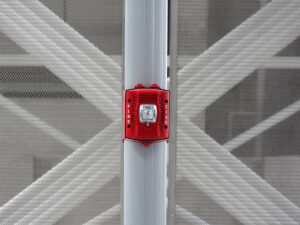
Commercial fire safety is absolutely critical—it protects people as well as property in the event of a fire, so you can enjoy peace of mind with the appropriate systems in place.
Fire safety is paramount in any commercial setting. Whether it’s an office space, a tech business, a warehouse, or a museum, the risk of fire can have devastating consequences. Not only can it cause harm to employees and visitors, but it can also result in significant financial losses and damage to property.
Office Spaces
- Install Smoke Alarms and Fire Extinguishers: Ensure that smoke alarms and fire extinguishers are installed at strategic locations throughout the office space. Regularly check and maintain them to ensure they are in working condition.
- Implement Fire Safety Training: Conduct regular fire safety training sessions for all employees. Educate them on evacuation procedures, the proper use of fire extinguishers, and how to respond in case of a fire emergency.
- Clear Exit Routes: Keep exit routes clear of clutter and obstacles. Make sure that doors are easily accessible and not blocked by furniture or equipment.
- Emergency Lighting: Install emergency lighting systems to ensure visibility during power outages or smoke-filled conditions. Emergency lighting can guide employees to safety exits in case of an emergency.
- Regular Inspections: Conduct regular inspections of electrical systems, heating, ventilation, and air conditioning (HVAC) systems, and other potential fire hazards. Address any issues promptly to prevent accidents.
Technology Businesses and Data Centers
- Proper Cable Management: Ensure that cables and wiring are organized and secured properly to prevent overheating and potential fire hazards. Use cable trays and cable ties to keep cables tidy and away from heat sources.
- Temperature Monitoring: Implement temperature monitoring systems in server rooms and data centers to detect overheating equipment. Install automatic shutdown mechanisms to prevent equipment from reaching dangerous temperatures.
- Fire Suppression Systems: Invest in advanced fire suppression systems, such as clean agent suppression systems, water mist, or hybrid extinguishing systems designed to extinguish fires quickly without causing damage to sensitive equipment.
- Backup Power Supply: Install uninterruptible power supply (UPS) systems to provide backup power in case of electrical failures or outages. This ensures that critical systems remain operational during emergencies.
- Regular Maintenance: Schedule regular maintenance for server racks, cooling systems, and electrical equipment to identify and address potential fire hazards before they escalate.
Warehouses and Distribution Centers
- Storage Practices: Implement proper storage practices to minimize fire risks. Store flammable materials in designated areas away from ignition sources and ensure they are properly labeled and stored according to safety regulations.
- Firebreaks and Clearances: Maintain clear firebreaks between storage racks and aisles to facilitate firefighting efforts and prevent the rapid spread of fire. Keep sufficient clearance around sprinkler systems to ensure they function effectively.
- Sprinkler Systems: Install automatic sprinkler systems throughout the warehouse or distribution center to provide early fire detection and suppression. Ensure that sprinklers are regularly inspected and maintained.
- Emergency Response Plan: Develop a comprehensive emergency response plan that includes evacuation procedures, assembly points, and communication protocols. Train employees on fire safety measures and conduct regular drills to ensure readiness.
- Fire-resistant Materials: Use fire-resistant building materials for construction and consider retrofitting existing structures with fire-resistant coatings or barriers to contain fires and prevent them from spreading.
Museums and Cultural Facilities
- Fire Detection Systems: Install specialized fire detection systems designed for sensitive environments, such as aspirating smoke detection systems, to provide early warning of potential fires without causing damage to artifacts or documents.
- Humidity and Temperature Control: Maintain proper humidity and temperature levels to preserve artifacts and documents while minimizing fire risks. Implement HVAC systems with fire dampers to prevent the spread of smoke and flames.
- Fireproof Storage Cabinets: Store valuable artifacts and documents in fireproof cabinets or safes to provide an extra layer of protection in case of fire. Ensure that cabinets are properly sealed to prevent smoke and water damage.
- Regular Inspections: Conduct regular inspections of electrical systems, lighting fixtures, and heating systems to identify and address potential fire hazards. Replace outdated or faulty equipment promptly to reduce risks.
- Collaboration with Fire Authorities: Work closely with local fire authorities to develop customized fire safety plans tailored to the unique needs of museums and archives. Seek their guidance on best practices and regulations for fire prevention and mitigation.
Fire Protection Services from Fireline
Whether you need smoke detectors, fire extinguishers, or an automatic sprinkler system installed at your commercial property, Fireline has you covered. We have been protecting people and property from fire damage since 1947—and our experience shows in our excellent work! We are known for our superb customer service, our expertise, and our reliability. For more information on how we can help your residential or commercial property, visit us online or give us a call at (800) 553-3405. We are in Baltimore, MD, with a second office in Leesburg, VA. For more fire safety tips, be sure to follow us on Facebook, Twitter, and LinkedIn.
